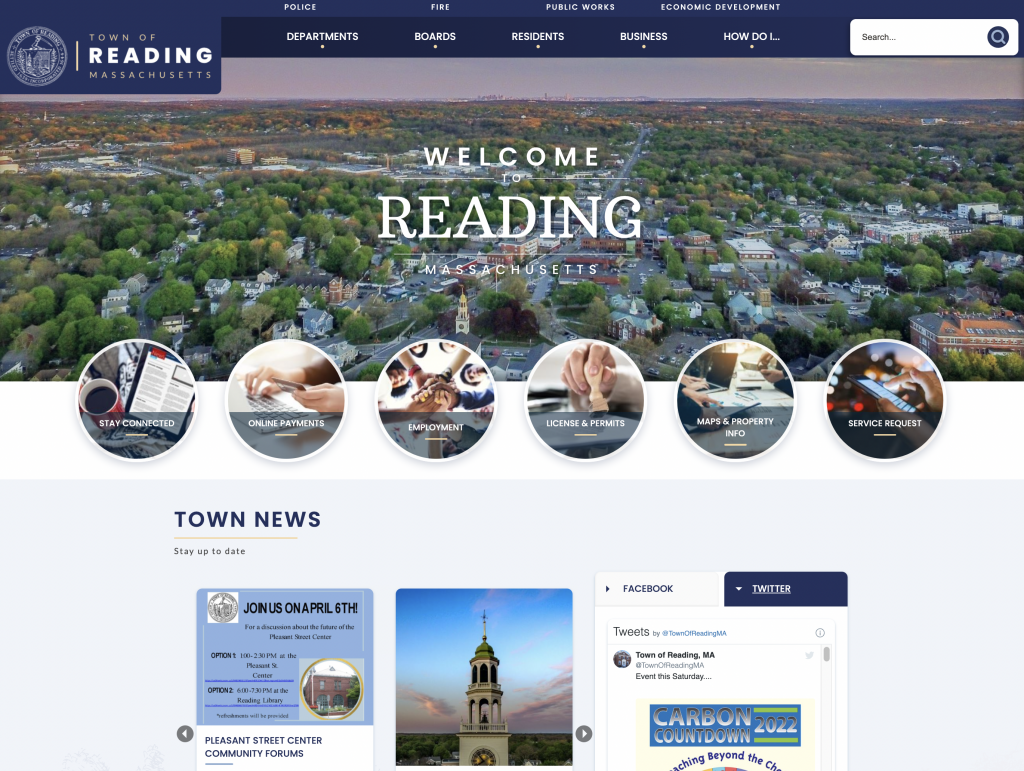Reading, MA — Jayne Wellman, Reading’s Business Administrator, shared the new town website with the Select Board. As Wellman showed off new interactive features such as quick link buttons and more user-friendly drop-down menus, she described an interface that should be easier for citizens to use and find the information they need. Other improvements include an improved news section, links to RCTV videos of government meetings, and an enhanced calendar that will show both government and as well as other town-wide activities. All five members of the Select Board expressed appreciation for the new look and functionality of the site.

Select Board member Christopher Haley expressed concern over how messages are shared with boards and committees. The new site will allow board members to be messaged through the site while keeping their personal email addresses private. Haley wondered if a different type of indirect system could be used. Town Manager Fidel Maltez suggested that the new system be tried first and affirmed that adjustments could be made if the system does not work as planned. Wellman concluded, sharing that the new site should be live by Wednesday afternoon, though a link on the new site will direct residents to the former site if needed. “Have patience with us; there will be some glitches,” Wellman added.
John O’Neill, chair of the Reading Center for Active Living Committee (RECALC), presented an update of the work that RECALC has accomplished since its establishment in November of 2021. Twenty-seven percent of Reading’s population is over sixty years of age, and that number is growing. O’Neill shared that the Pleasant Street Center has outlived its useful life and has several issues, including having only one bathroom located on the third floor, a small activity space, and insufficient lobby and gathering spaces. O’Neill estimates that only ten to fifteen percent of the current senior population uses the Pleasant Street Center.
“A number of our elders from Reading go to other communities,” O’Neill offered.
According to O’Neill, RECALC has been surveying and visiting centers in other communities. Of the 21 peer communities identified, six have joint community centers. “Some communities see [joint centers] as a bridge,” O’Neill shared. “You want a place where [residents] can say, ‘Here’s a place with things that interest me,” O’Neill continued.
Next steps for the RECALC include community surveys to determine need as well as two community forums planned for April 6, one at the Pleasant Street Center and one at the Reading Public Library. O’Neill was clear to point out that no choices have yet been made, and all ideas are still on the table. He concluded with wisdom from an elder director in Wilmington, “Don’t ask people if they want a new senior center; ask them if there are unmet needs.”
Community Development Director Julie Mercier presented thoughts regarding the MBTA Communities Guidelines developed by the Department of Housing and Community Development (DHCD) after the legislature passed the housing choice legislation last January. Mercier shared that the guidelines suggest that Reading is a “bus community” as well as a “commuter rail community,” and as a result, the town needs to provide zoning which would allow for continued housing growth within a half-mile radius of the train station. This zoning should allow for multi-family development and increased density to potentially create over 1,900 additional housing units in that radius.
Mercier shared that current zoning, even with the Downtown Smart Growth District, would not even come close to meeting those objectives, and she doubts, given the amount of single-family homes and the size of many of the lots in the proposed radius, that Reading could even achieve such a change. Mercier continued that the designation as a “bus community” is likely erroneous as there is only one “lightly utilized” MBTA bus line in town.
Maltez added to Mercier’s comments, suggesting that they were worried about meeting the guidelines even in Chelsea, where he was employed prior to Reading. Maltez also indicated that he has had discussions with Reading’s legislative delegation regarding the proposals and that they have vowed to suggest changes to the DHCD guidelines. Haley expressed dismay over the guidelines when it was revealed that no community in the commonwealth meets the standard.
“Who came up with this? Why are we even discussing something that no other town fits into?” Haley queried.
The Select Board voted 5-0 to approve the transfer of the annual restaurant all-liquor license to a new restaurant, Public Kitchen, which will be located at 530 Main Street, former location of Biltmore & Main. Director and manager Michelle Marcoulier-Shaw described the new destination as one that will be both family and adult-friendly. “We are not a bar that serves food; we are a restaurant that serves alcohol,” Marcoulier-Shaw declared.
The board welcomed the new Director of Equity and Social Justice, Dr. Sudeshna Chatterjee to town. Select Board member Anne Landry expressed gratitude to Chatterjee, describing her arrival as “incredibly gratifying.” Chatterjee shared that she views her task to “sustain, grow, and build up existing efforts in the area of equity, and think collaboratively about designing new efforts, partnerships, and programs.” Chatterjee will be commencing her work through the auspices of the Reading Public Library.
A scheduled presentation of recommendations from the Parking Recommendation Committee had to be delayed due to concerns over open meeting law. The Select Board adjourned at 10:15 pm.
